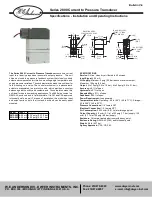
12
3
BASIC OPERATION
■
Call procedure
When your system employs tone signaling (excluding CTCSS
and DTCS), the call procedure may be necessary prior to voice
transmission. The tone signalling employed may be a selec-
tive calling system which allows you to call specific station(s)
only and prevent unwanted stations from contacting you.
q
Select the desired TX code channel or 2/5-tone code
according to your System Operator’s instructions.
• This may not be necessary depending on programming.
• Refer to pgs. 13 or 14 for selection.
w
Push the call key (assigned to one of the dealer program-
mable keys: [Up], [Down], [P0], [P1], [P2], [P3],
[Emergency] and [Monitor]) or [PTT].
e
After transmitting a 2/5-tone code, the remainder of your
communication can be carried out in the normal fashion.
■
Receiving and transmitting
NOTE:
Transmitting without an antenna may damage the
transceiver. See p. 1 for antenna attachment.
Receiving:
q
Rotate [VOL] to turn the power ON.
w
Push [UP] or [DOWN], or rotate [ROTARY SELECTOR]*
to select a channel, in sequence.
*Depending on the pre-setting.
e
When receiving a call, adjust the audio output level to a
comfortable listening level.
Transmitting:
Wait for the channel to become clear to avoid interference.
q
While pushing and holding [PTT], speak into the micro-
phone at a normal voice level.
w
Release [PTT] to return to receive.
IMPORTANT:
To maximize the readability of your signal;
1. Pause briefly after pushing [PTT].
2. Hold the microphone 5 to 10 cm (2 to 4 inches) from
your mouth, then speak into the microphone at a normal
voice level.
Selective calling
Non-selective calling
IC-F43GT_GS.qxd 04.4.9 1:10 PM Page 12 (1,1)
















































